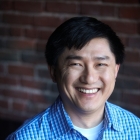After Portuguese immigrants introduced the ukulele to Hawaii in 1879, King David Kalakaua fell in love with the four-stringed instrument and encouraged its use for a renaissance of Hawaiian cultural arts. Kalakaua mixed old and new to make the ukulele a symbol of Hawaii, and his legacy continues. Today, the mashup is in the hands — and fingers — of ukulele virtuoso Jake Shimabukuro, featured on The New Legacy Issue’s cover.
Shimabukuro, who attained rock star status after his cover of the Beatles’ “While My Guitar Gently Weeps” hit YouTube, has added a modern flair to this traditional Hawaiian instrument. He’s creating his own legacy for the ukulele with his music.
“As DJ Qbert [has done with] the turntable, Jake's music has impacted the way people perceive the ukulele,” says Aaron Yoshino, who photographed Shimabukuro for the cover. “That truly is leaving behind a legacy.”

This issue is about the intersection of past and present.
In Laos, the legacy of America’s war in Southeast Asia is a countryside littered with unexploded bombs that still threaten to kill and maim. Santi Suthinithet profiles Laotian Americans who advocate for the clearing of these bombs and work to improve living conditions in the country.
After World War II, large numbers of Americans began adopting babies from Asia. Kelley Christine Blomberg, who was one those babies, writes about an intriguing phenomenon: Asian adoptees adopting children from their birth countries as a way to connect to their heritage.
In our Food section, Darryl Campbell looks at the mainstreaming of Asian home-cooked cuisine and its simultaneous decline among second- and third-generation Asian Americans. Susan C. Kim examines how San Francisco Bay Area manufacturers of handmade tofu, a centuries-old tradition, continue to thrive; and in the You-Thought-You-Knew-How category, Sylvan Mishima Brackett, owner of Japanese catering company Peko-Peko, provides tips for cooking rice to perfection.
Redux takes us back to 1997 and reassesses the impact of Asian Avenue, the pioneering website that was a social network before social networks technically existed.
The issue closes with “Pilgrims (What Is Lost and You Cannot Regain),” the winning entry in the Asian American Short Story Contest run by Hyphen and The Asian American Writers’ Workshop. Winning author Sunil Yapa tells a Sri Lankan immigrant’s poignant story of anguish and reconciliation.
History offers lessons for each new generation. At Hyphen, we’re always looking forward with an eye on what’s behind us.










Comments